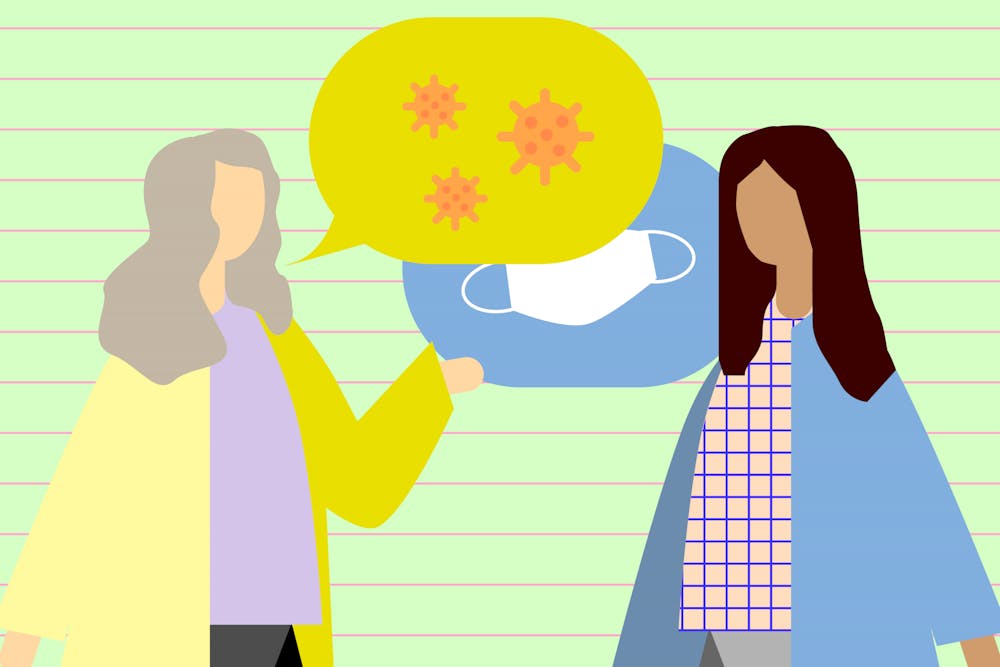Vaccines have been described as some of the greatest inventions of the 20th century by so many—they have saved countless lives, eradicated diseases such as smallpox, and all but eliminated diseases such as polio. Yet opposition to vaccination has existed as long as vaccination itself has existed. The origins of the anti–vaxxer can be traced back to the 1800s, when the smallpox vaccine became widespread and, with it, fear and protest. People questioned the vaccine's efficacy, the ages at which children should receive the vaccine, the risk of the vaccine in comparison to the disease, and whether or not local authorities should enforce compulsory vaccination in the case of an outbreak.
The misleading claims and concerns we hear about the newly released COVID–19 vaccines are very similar to those made about smallpox vaccinations 200 years ago—the ingredients are toxic, the vaccines have not been thoroughly tested, the scientists who produced them have falsified results, or even that the disease itself is all a conspiracy. Even though the concerns and claims of anti–vaxxers have largely remained unchanged over the eras, today’s anti–vaxxers have a tool that those in the 19th century could have never even dreamed of: social media.
The campaign against the vaccine has already begun. Within the first 48 hours of people in the United States receiving the Pfizer vaccine, anti–vaccine activists had already begun spreading misinformation on social media platforms like Facebook and Instagram, fabricating stories of allergic reactions and sharing claims that friends of friends have died after receiving the vaccine. Anti–vaxxers have also flooded timelines with tutorials on how to refuse a COVID–19 vaccine.
One such tutorial was posted by musician Nino Brown who has over 1.6 million followers on Facebook and over 1 million followers on Instagram. He urged his followers to refuse the vaccine, citing the same misinformation as countless other posts. Brown’s video was viewed over 60,000 times on Facebook and 57,000 times on Instagram before it was taken down.
Public opinion polls have indicated that millions of Americans are what is referred to in the medical community as “vaccine hesitant.” This hesitancy is only reinforced by outlandish and exaggerated stories of people who experience unwanted side effects from vaccines or coincidently die after receiving a vaccine. In today’s form of activism, groups—from Beyoncé’s Beyhive to QAnon adherents—are able to leverage an entire social media ecosystem to promote their own agendas. If they succeed in getting a hashtag or a meme to trend, they are able to get their message to a larger audience. This is how the deadly narrative spreads.
One such group that was trending was the Facebook group entitled "Stop Mandatory Vaccination," a group opposed to what they claim as "deadly vaccinations.” It boasted over 195,000 members. Some of its most recent posts include videos claiming that the COVID–19 vaccine is killing people, as well as a post claiming that children are having the disease injected into them. The group became so large that Facebook removed it from the site in November for violating the community guidelines. Despite Facebook’s attempts to silence vaccine misinformation, a quick search will reveal that thousands of anti–vax groups still exist on the site.
The ramifications of refusing vaccination are endless. In fact, the World Health Organization has even listed vaccine hesitancy as one of the top threats to global health. The slowing vaccine uptake has led to increases in both measles outbreaks and death due to measles, a disease which had almost been completely eradicated thanks to the MMR vaccine. In 2019, four European countries lost their measles elimination status as a result of vaccine hesitancy. In the case of COVID–19, a much deadlier disease, refusing to vaccinate could kill or permanently disable hundreds of thousands of people. The anti–vax community has only grown since 2019, both in influence and size, and now poses an even greater risk.
Countering grassroots anti–vax propaganda is a significant challenge for those of us who want the vaccination effort to succeed and for this pandemic to end. Since most of this plays out on social media, more often than not, it is viewed as a problem belonging only to social media platforms. To be fair, this is partly true—the attitudes of the Silicon Valley conglomerates enabled these groups to grow for years—but we as humans also need to play our collective part to address this misinformation. Research shows that, when it comes to vaccination, discussing the vaccine with family and friends appears to eliminate the negative views of vaccination that social media often promotes. So while one person can’t shut down massive Facebook groups or eradicate every anti–vax post that exists, by being cognizant of what we say and share, we can do our part to bring an end to the pandemic and get back to partying in sweaty basements.







